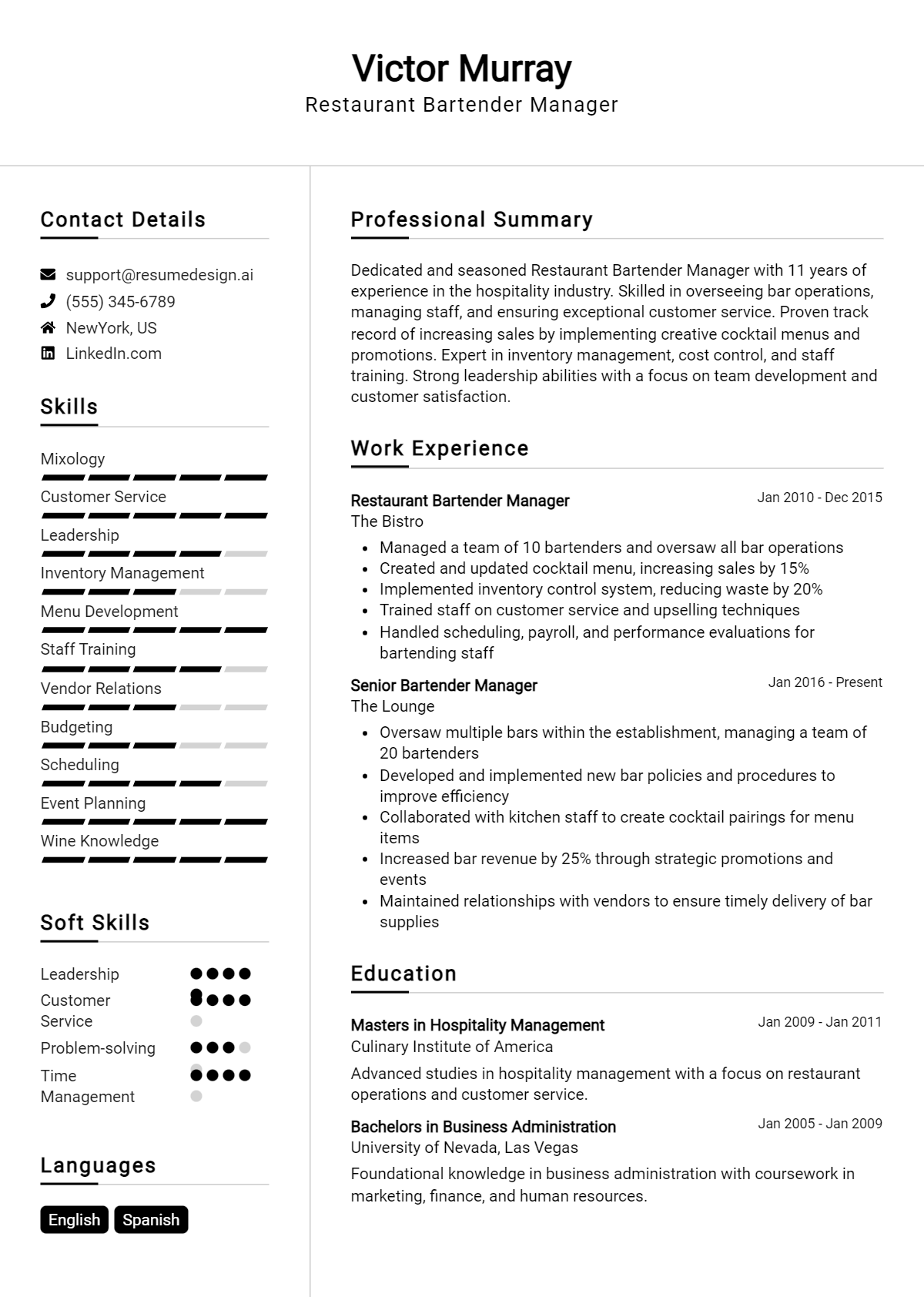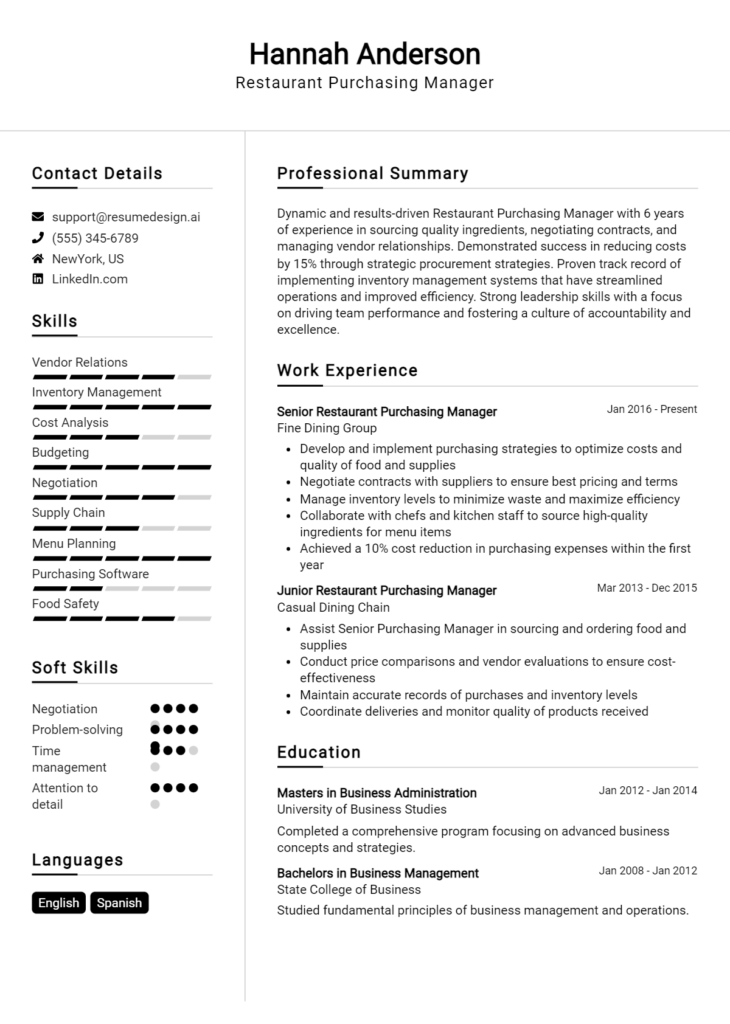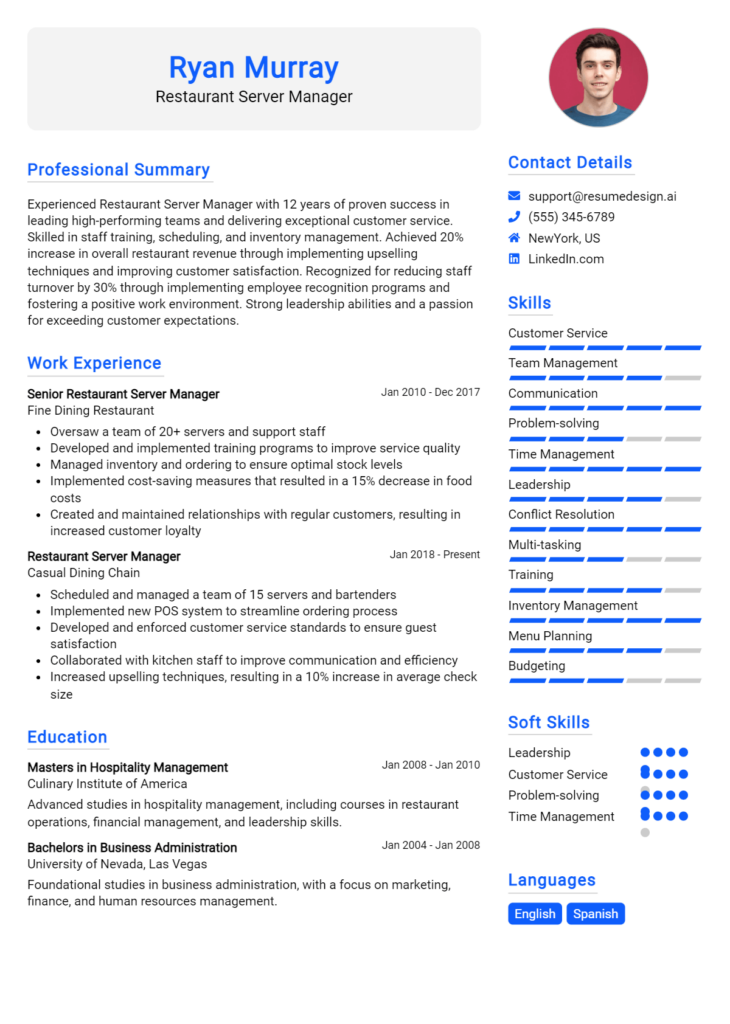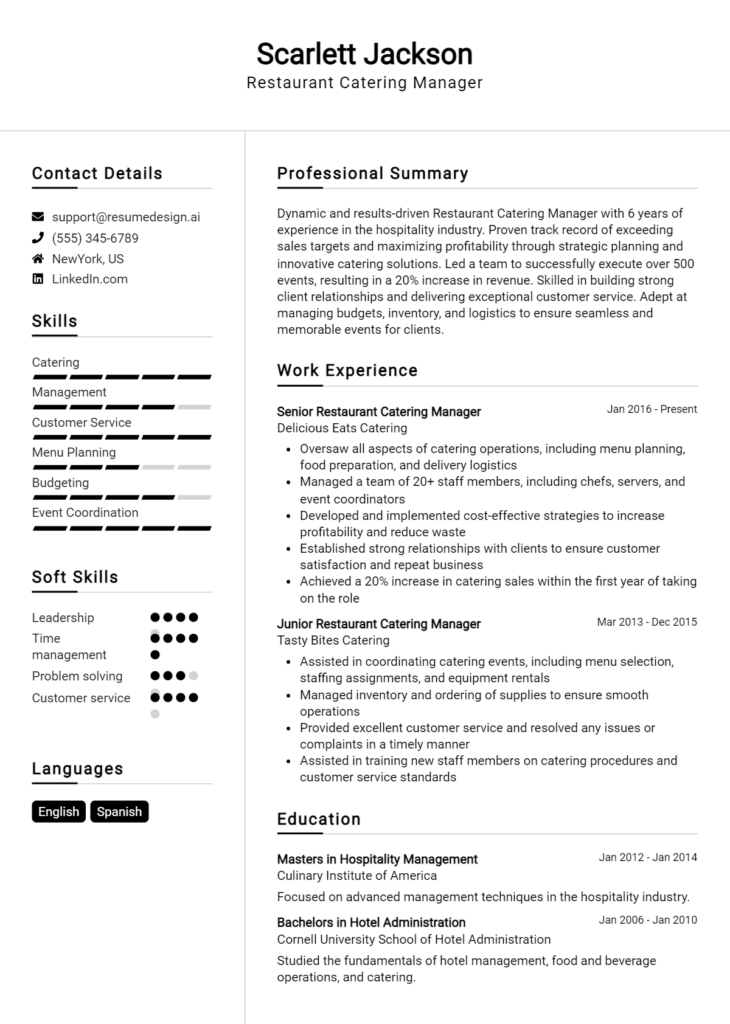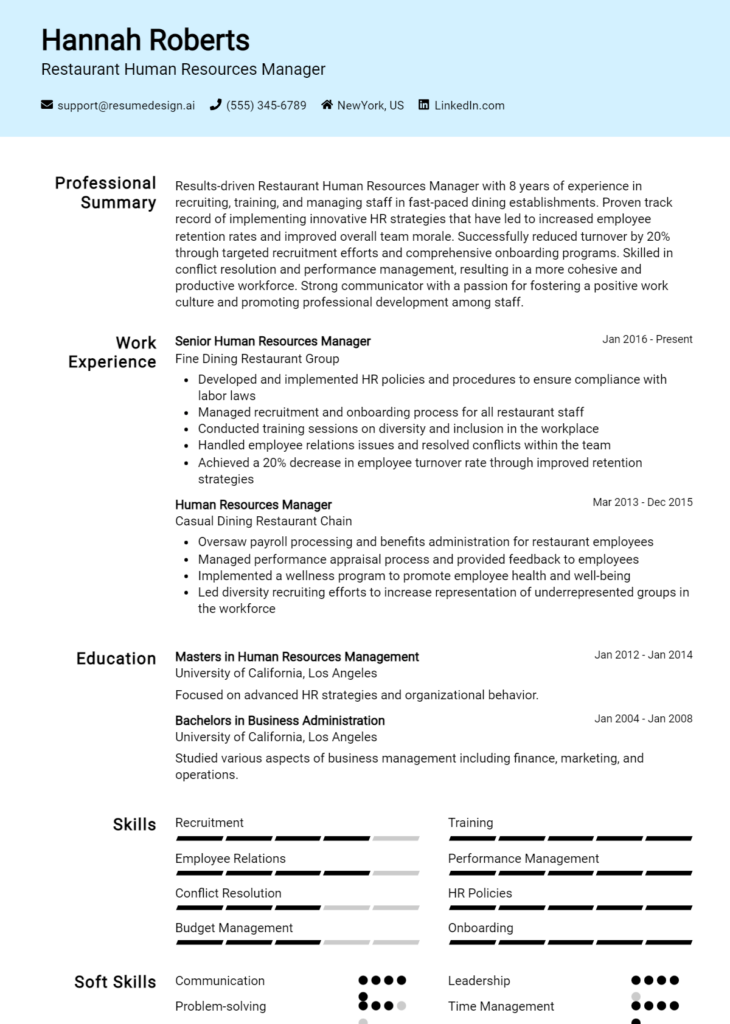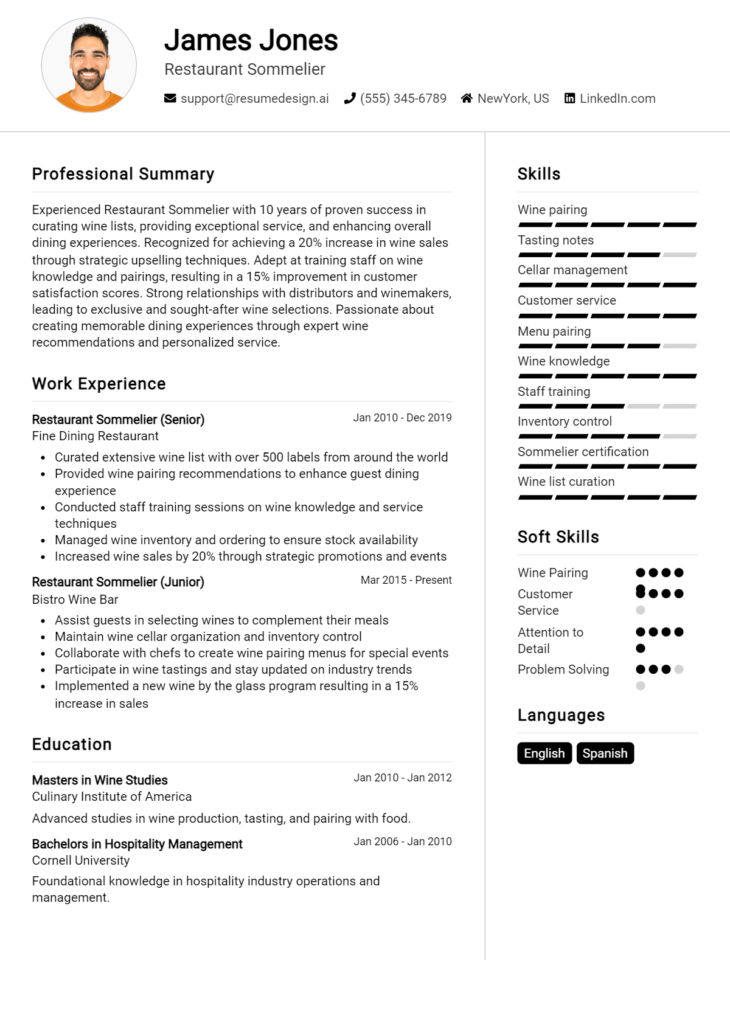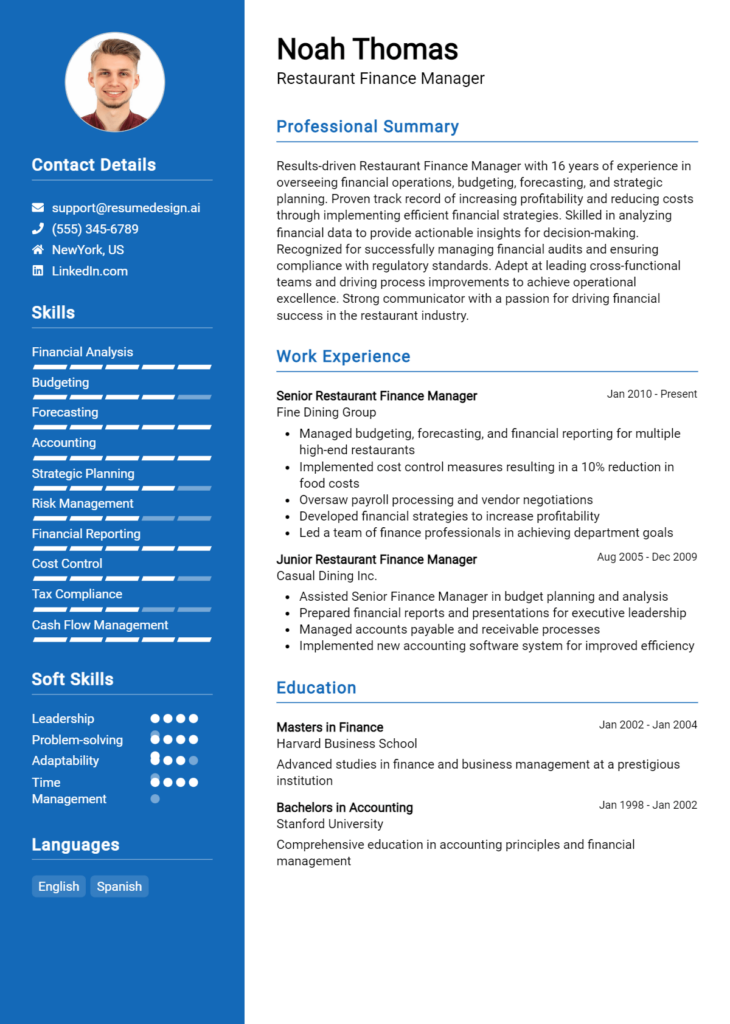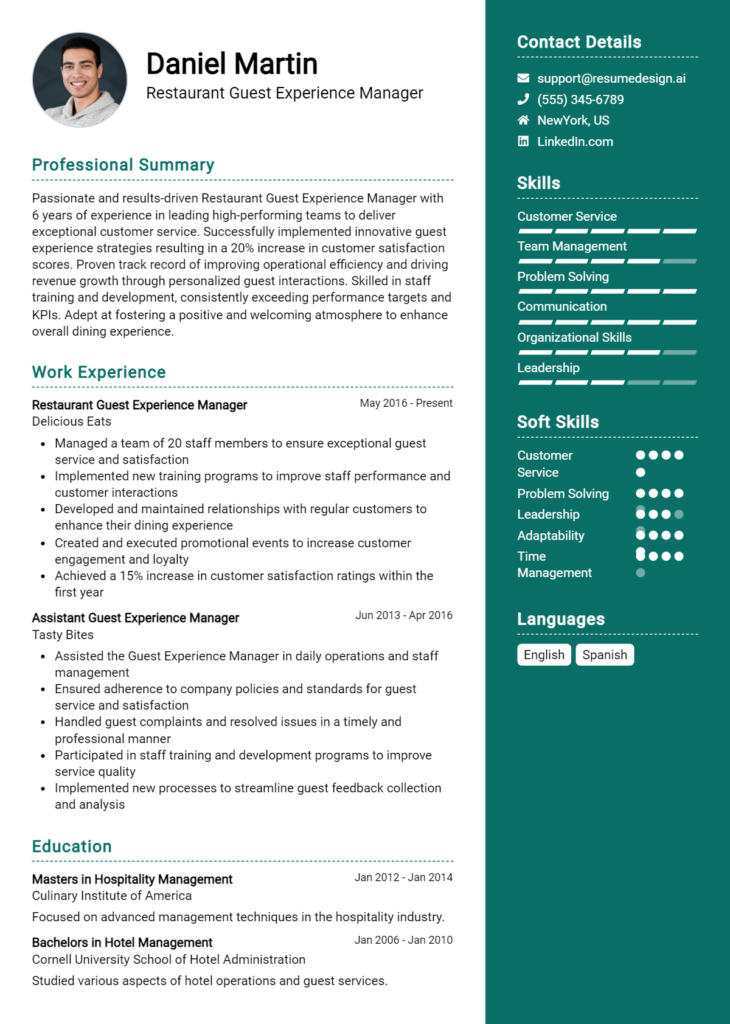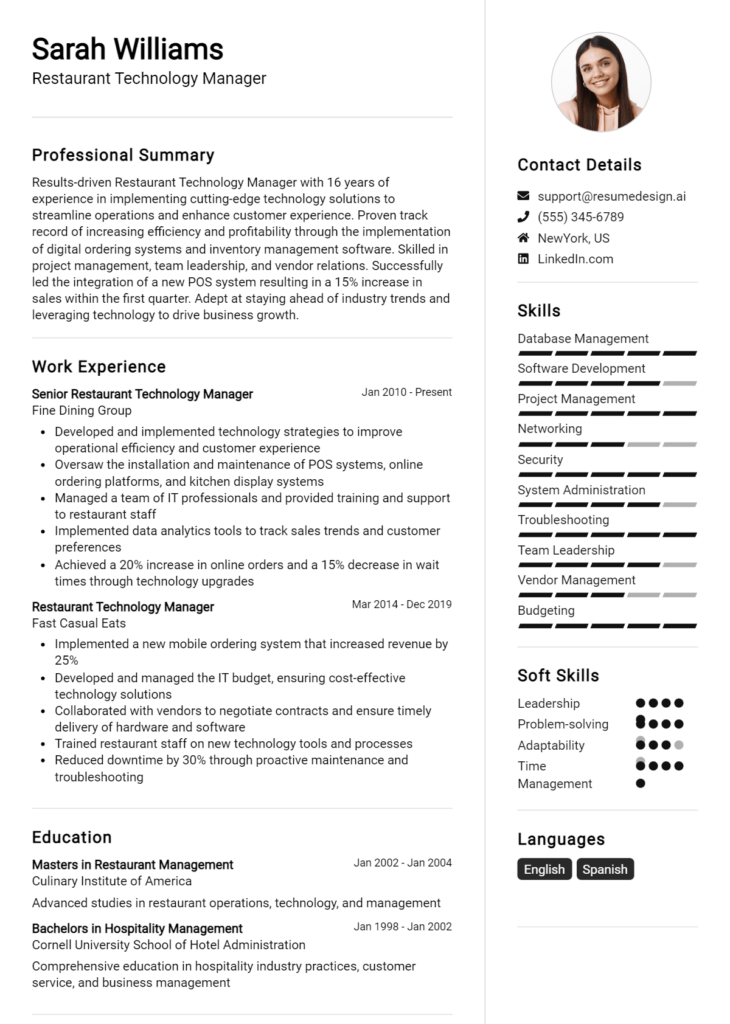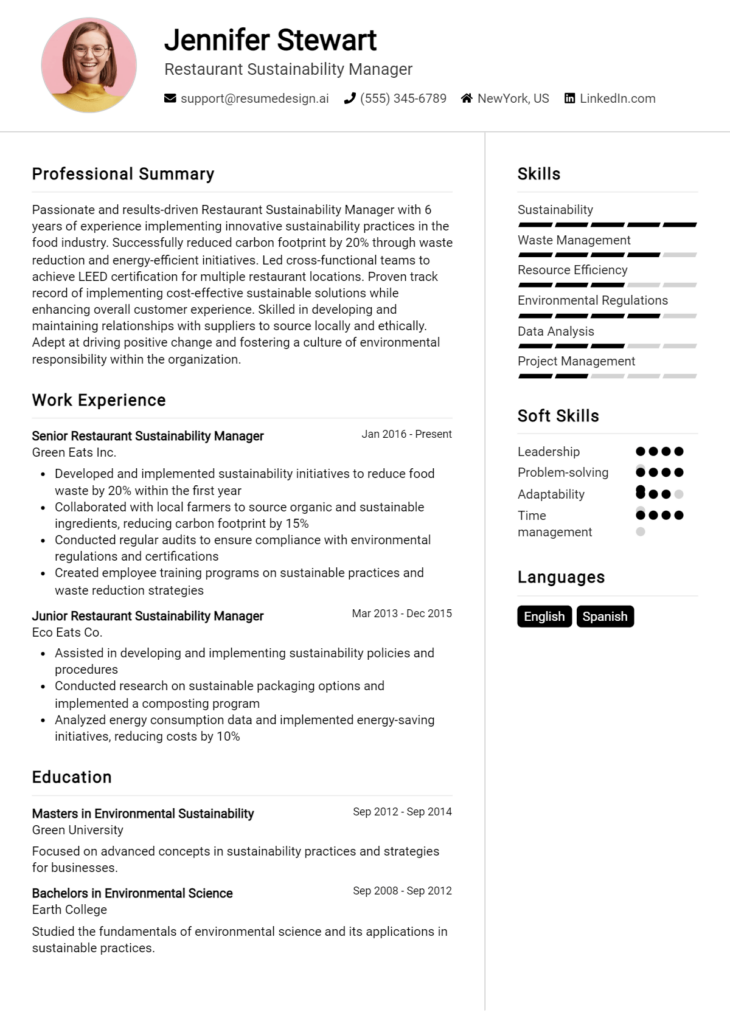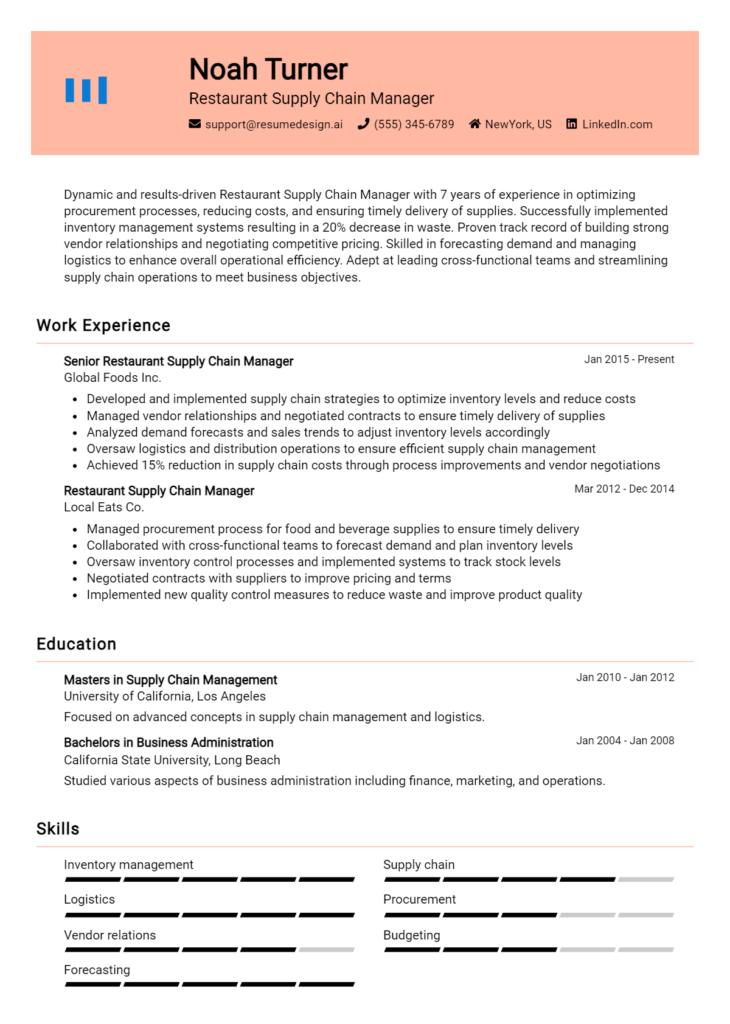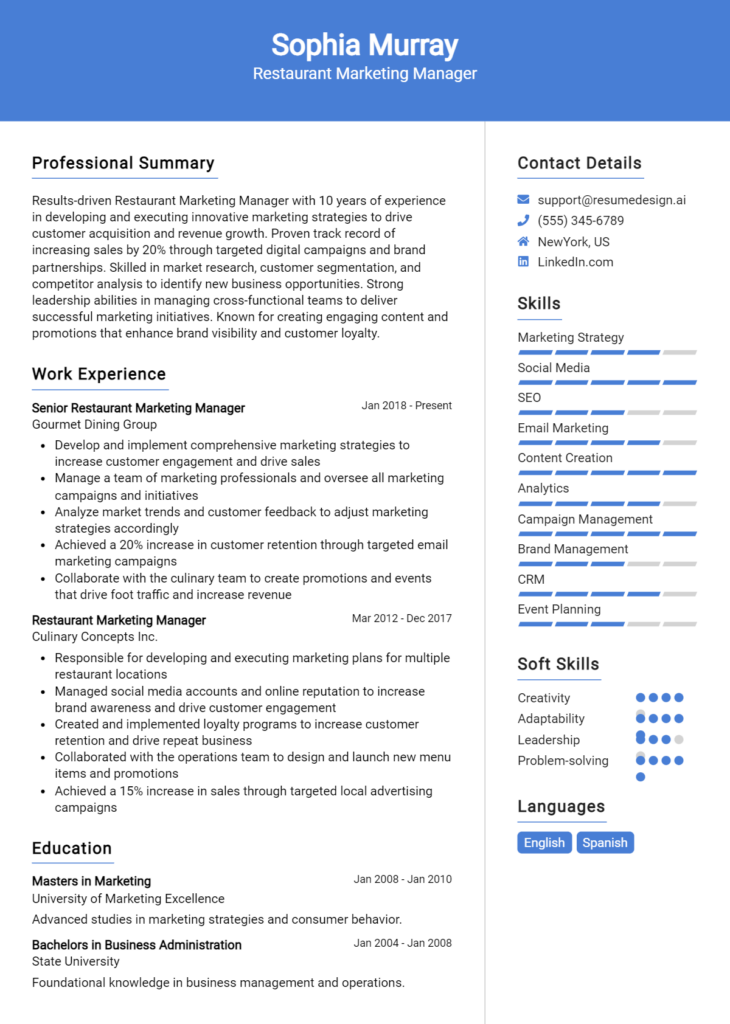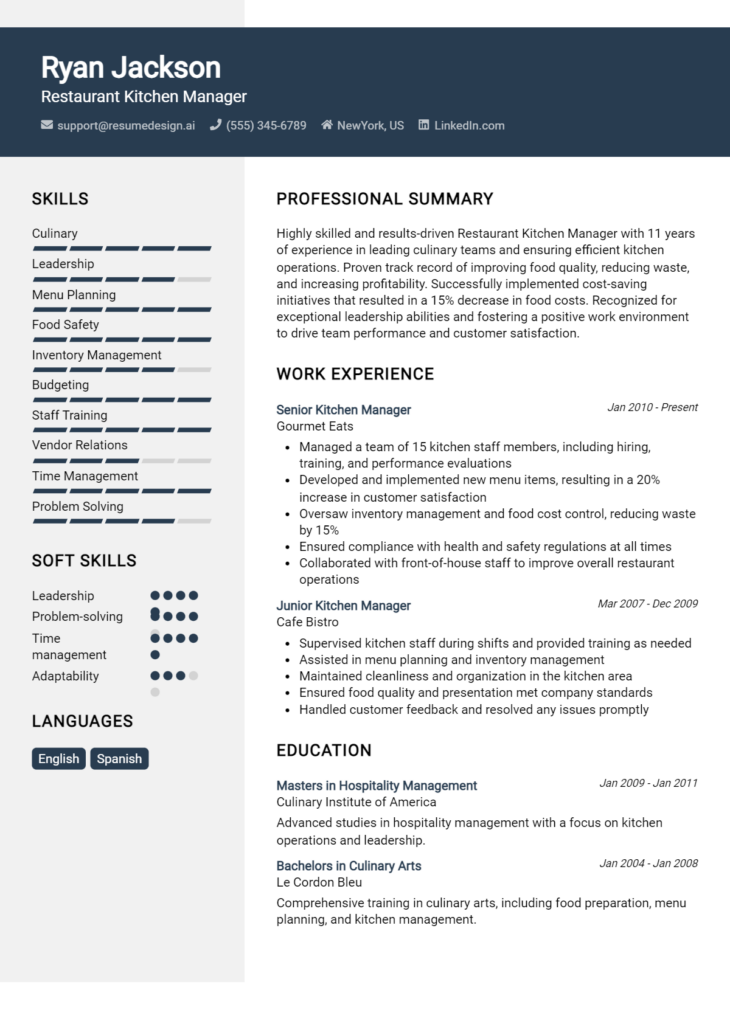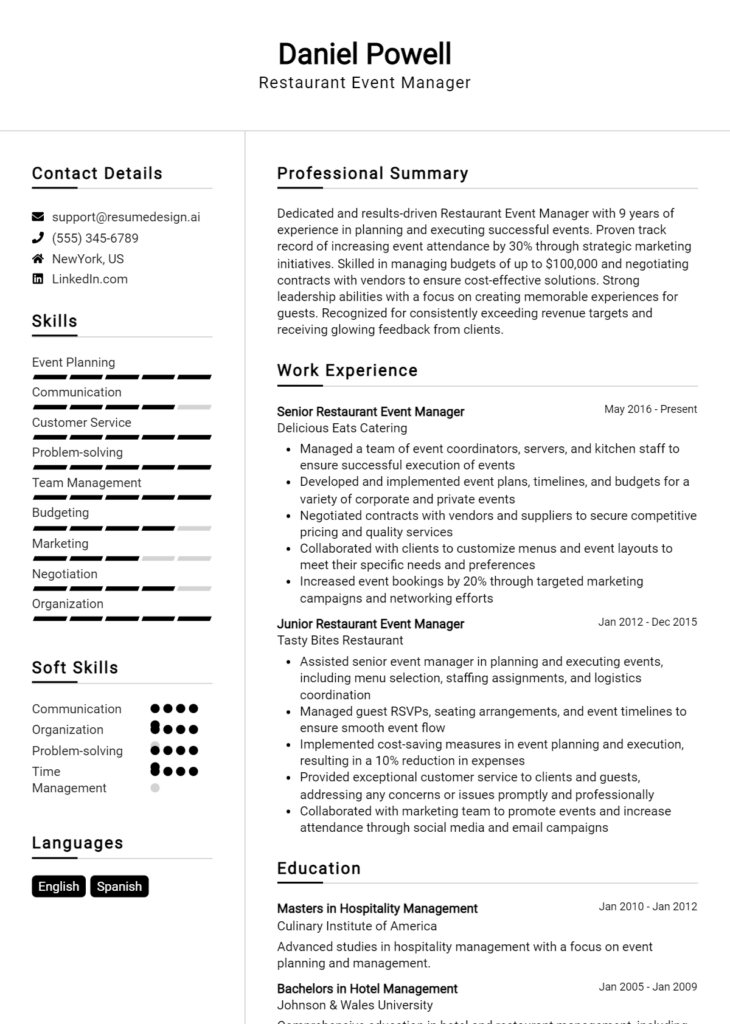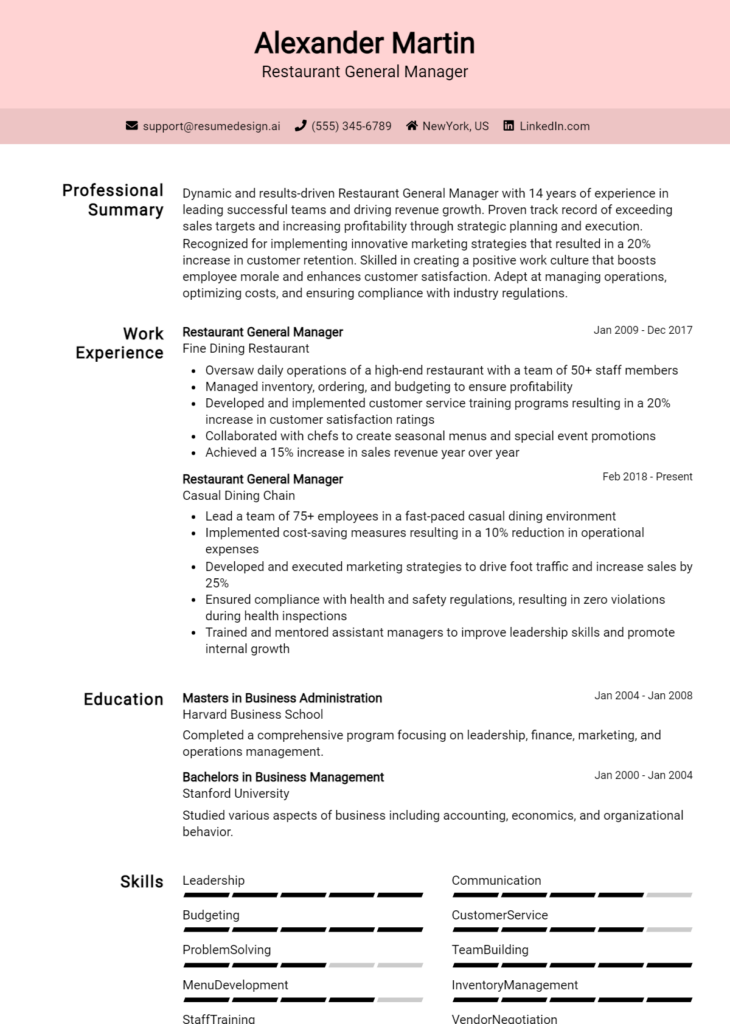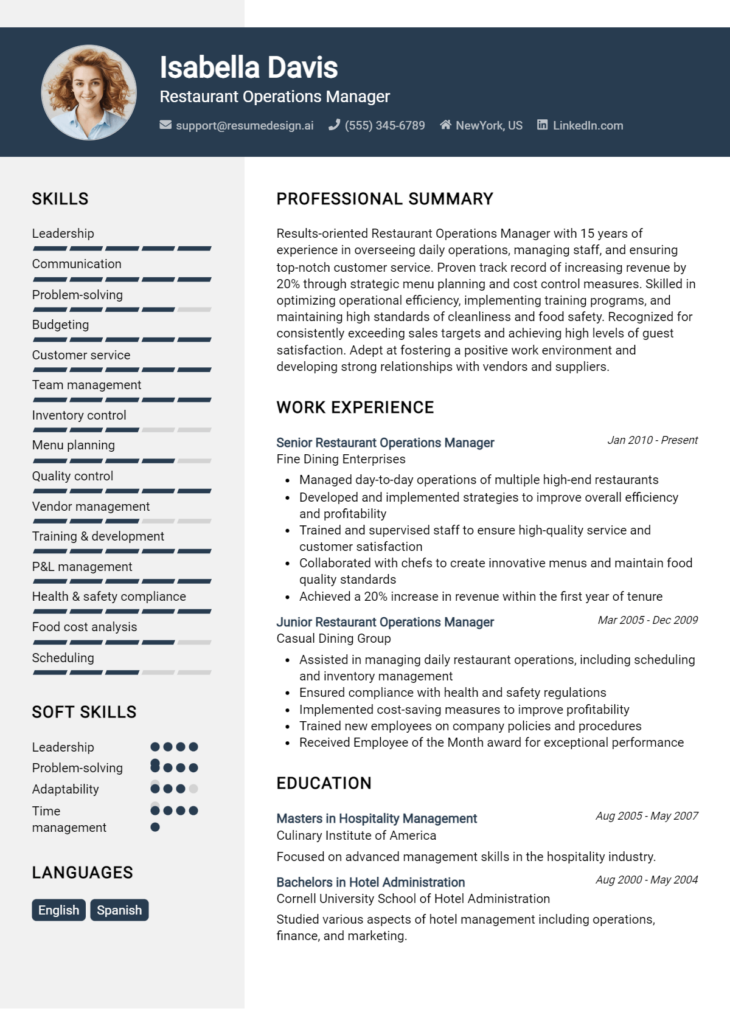Restaurant Bartender Manager Core Responsibilities
The Restaurant Bartender Manager plays a crucial role in ensuring seamless operations by bridging the front-of-house and back-of-house functions. Key responsibilities include overseeing bar operations, managing staff, and crafting innovative drink menus. Essential skills encompass technical knowledge of mixology, operational efficiency, and adept problem-solving abilities to address customer concerns. These competencies are vital for achieving organizational goals, and a well-structured resume can effectively highlight these qualifications to potential employers.
Common Responsibilities Listed on Restaurant Bartender Manager Resume
- Supervise and train bartending staff to maintain high service standards.
- Develop and implement creative cocktail menus to enhance customer experience.
- Manage inventory, ordering, and supplier relationships for bar supplies.
- Ensure compliance with health, safety, and alcohol regulations.
- Monitor and control bar costs and profitability through effective budgeting.
- Provide exceptional customer service and handle complaints professionally.
- Collaborate with kitchen staff to create drink pairings with menu items.
- Organize and promote special events or happy hours to attract customers.
- Conduct regular staff meetings to discuss performance and training needs.
- Utilize POS systems for accurate order processing and financial tracking.
- Maintain cleanliness and organization of the bar area at all times.
- Stay updated on industry trends and new beverage offerings.
High-Level Resume Tips for Restaurant Bartender Manager Professionals
A well-crafted resume is essential for Restaurant Bartender Manager professionals, as it serves as the first impression a candidate makes on potential employers. This document must encapsulate not only the individual's skills and experiences but also their unique achievements in the fast-paced world of hospitality. A standout resume can set you apart from the competition, showcasing your ability to manage a bar effectively while providing exceptional customer service. In this guide, we will provide practical and actionable resume tips specifically tailored for Restaurant Bartender Manager professionals to help you make a lasting impact on hiring managers.
Top Resume Tips for Restaurant Bartender Manager Professionals
- Tailor your resume to the specific job description by incorporating keywords and phrases that align with the role.
- Highlight relevant experience by detailing your previous roles, focusing on responsibilities related to bartending and management.
- Quantify your achievements (e.g., "Increased bar sales by 20% over six months") to provide concrete evidence of your effectiveness.
- Showcase industry-specific skills such as mixology, inventory management, and staff training to demonstrate your expertise.
- Include certifications relevant to bartending and management, such as TIPS or ServSafe, to enhance your qualifications.
- Utilize a clean and professional format that makes your resume easy to read and visually appealing.
- Incorporate a summary statement at the top of your resume that encapsulates your unique selling points and career objectives.
- Leverage bullet points for clarity and impact, making your accomplishments easy to digest for hiring managers.
- Include any awards or recognitions received in the bartending field to further validate your skills and dedication.
- Proofread your resume multiple times to eliminate any errors, ensuring a polished and professional presentation.
By implementing these tips, Restaurant Bartender Manager professionals can significantly increase their chances of landing a job in this competitive field. A resume that effectively showcases your skills, achievements, and relevant experience not only captures the attention of hiring managers but also positions you as a strong candidate ready to excel in a dynamic restaurant environment.
Why Resume Headlines & Titles are Important for Restaurant Bartender Manager
In the competitive landscape of the restaurant industry, the role of a Restaurant Bartender Manager is both dynamic and demanding. A well-crafted resume headline or title is crucial as it serves as the first impression a hiring manager has of a candidate. A strong headline can immediately grab attention and succinctly summarize a candidate's key qualifications in one impactful phrase. It should be concise, relevant, and directly related to the job being applied for, effectively setting the tone for the rest of the resume and increasing the likelihood of gaining an interview.
Best Practices for Crafting Resume Headlines for Restaurant Bartender Manager
- Keep it concise: Aim for a headline that is brief yet informative, ideally one to two lines.
- Be role-specific: Tailor the headline to reflect the specific position of Restaurant Bartender Manager.
- Highlight key skills: Incorporate essential skills that are relevant to the role, such as mixology or staff management.
- Use action-oriented language: Choose strong verbs that convey leadership and initiative.
- Include quantifiable achievements: If possible, mention any notable accomplishments that can set you apart.
- Utilize industry-specific keywords: Use terminology that resonates within the hospitality sector to enhance relevance.
- Make it engaging: Aim for a tone that reflects passion and enthusiasm for the bartending and management field.
- Avoid clichés: Steer clear of overused phrases that can dilute the impact of your headline.
Example Resume Headlines for Restaurant Bartender Manager
Strong Resume Headlines
Dynamic Restaurant Bartender Manager with 10+ Years of Experience in Crafting Unique Cocktails and Leading High-Performing Teams
Award-Winning Bartender Manager Specializing in Staff Training and Exceptional Customer Service
Results-Driven Bartending Manager with Proven Track Record of Boosting Bar Revenue by 30% through Innovative Drink Menus
Weak Resume Headlines
Bartender
Experienced in Food and Drink
The strong headlines are effective because they provide clear, specific insights into the candidate's experience and skills, immediately showcasing their value to potential employers. They also utilize powerful language and relevant metrics that can resonate with hiring managers. In contrast, the weak headlines fail to impress as they are vague and generic, lacking the necessary detail and impact that would compel someone to read further. A headline should not only attract attention but also communicate what makes a candidate uniquely qualified for the role.
Writing an Exceptional Restaurant Bartender Manager Resume Summary
A resume summary is a crucial element for a Restaurant Bartender Manager, as it serves as the first impression a hiring manager will have of a candidate. A well-crafted summary quickly captures attention by emphasizing key skills, relevant experience, and significant accomplishments that align with the job role. It should be concise and impactful, tailored specifically to the position being applied for, ensuring that the candidate stands out in a competitive job market.
Best Practices for Writing a Restaurant Bartender Manager Resume Summary
- Quantify achievements: Use numbers and metrics to demonstrate your impact and success in previous roles.
- Focus on relevant skills: Highlight specific skills that are essential for a Restaurant Bartender Manager, such as mixology, customer service, and staff management.
- Tailor the summary: Customize the summary to match the job description and requirements of the specific position you are applying for.
- Keep it concise: Aim for 3-5 sentences that deliver the most important information without overwhelming the reader.
- Use action verbs: Start sentences with strong action verbs to convey a sense of initiative and accomplishment.
- Highlight leadership qualities: Emphasize experience in managing teams and driving a positive work environment.
- Showcase industry knowledge: Mention familiarity with current trends, cocktail recipes, and customer preferences in the bartending industry.
- Include soft skills: Incorporate interpersonal skills that enhance guest experiences, such as communication and conflict resolution.
Example Restaurant Bartender Manager Resume Summaries
Strong Resume Summaries
Dynamic Bartender Manager with over 8 years of experience in high-volume establishments, recognized for increasing bar revenue by 25% through innovative cocktail menus and exceptional customer engagement.
Results-oriented Bartender Manager with a proven track record of leading a team of 10 in a fast-paced bar environment, achieving a 15% reduction in staff turnover while improving customer satisfaction ratings by 30%.
Creative and detail-oriented Bartender Manager skilled in mixology and event coordination, successfully organizing over 50 themed events that boosted weekly sales by 40% and enhanced guest experiences.
Experienced Bartender Manager with expertise in inventory management and cost control, successfully reducing waste by 20% while maintaining an extensive selection of premium spirits and craft cocktails.
Weak Resume Summaries
Bartender with several years of experience looking for a managerial position.
I am a hard worker who is interested in bartending and managing a team in a restaurant.
The strong resume summaries stand out due to their specific achievements, quantifiable results, and relevance to the role of a Restaurant Bartender Manager. They showcase the candidate's experience and skills in a compelling way that aligns with the job's requirements. In contrast, the weak summaries fail to provide concrete details or measurable outcomes, making them generic and less appealing to hiring managers seeking qualified candidates.
Work Experience Section for Restaurant Bartender Manager Resume
The work experience section of a Restaurant Bartender Manager resume is pivotal in demonstrating the candidate's expertise in both bartending and management. This section not only highlights technical skills, such as mixology and beverage knowledge, but also showcases the ability to lead teams effectively and ensure the delivery of high-quality products. Employers look for quantifiable achievements that illustrate the candidate's impact on previous establishments, making it essential to align experiences with industry standards to stand out in a competitive job market.
Best Practices for Restaurant Bartender Manager Work Experience
- Focus on specific technical skills related to bartending and beverage management.
- Quantify achievements with metrics, such as sales growth percentages or customer satisfaction scores.
- Highlight experiences that demonstrate effective team leadership and staff training.
- Showcase successful collaborations with kitchen staff and management to enhance service quality.
- Include examples of creative drink menus or special events that attracted patrons.
- Emphasize knowledge of industry trends and compliance with health regulations.
- Use action verbs to convey proactive responsibilities and initiatives taken.
- Tailor work experiences to reflect the specific requirements of the job being applied for.
Example Work Experiences for Restaurant Bartender Manager
Strong Experiences
- Increased bar sales by 30% within six months by introducing a seasonal cocktail menu and implementing targeted promotions.
- Successfully managed a team of 10 bartenders, resulting in a 15% improvement in customer satisfaction ratings as per feedback surveys.
- Developed and executed a staff training program that reduced drink preparation time by 20% and improved overall service efficiency.
- Collaborated with the kitchen to create signature pairings for special events, leading to a 25% increase in event bookings over the previous year.
Weak Experiences
- Worked as a bartender at a busy restaurant, where I made drinks and served customers.
- Managed a small team of bartenders and helped with scheduling.
- Participated in various events and assisted in setting up the bar area.
- Responsible for ordering supplies and keeping the bar stocked.
The examples of strong experiences are considered effective because they provide specific, quantifiable outcomes that demonstrate the candidate's impact on both sales and team performance. They highlight leadership skills and the ability to innovate, which are crucial for a Restaurant Bartender Manager. In contrast, the weak experiences lack detail and measurable results, making it difficult for potential employers to gauge the candidate's true contributions and capabilities in a competitive environment.
Education and Certifications Section for Restaurant Bartender Manager Resume
The education and certifications section of a Restaurant Bartender Manager resume plays a critical role in showcasing a candidate's qualifications and commitment to the hospitality industry. This section not only highlights the candidate's academic background but also underscores industry-relevant certifications and ongoing learning efforts. By including relevant coursework, specialized training, and recognized certifications, candidates can significantly enhance their credibility and demonstrate their alignment with the job requirements. In an industry where knowledge of mixology, customer service, and management practices is vital, this section provides potential employers with tangible evidence of the candidate's expertise and dedication to their profession.
Best Practices for Restaurant Bartender Manager Education and Certifications
- Include relevant degrees in hospitality, business management, or a related field.
- List industry-recognized certifications such as TIPS, ServSafe, or bartending licenses.
- Highlight any specialized training in mixology, wine pairing, or cocktail crafting.
- Provide details about relevant coursework that enhances your skills, such as customer service or beverage management.
- Continuously update your certifications to reflect the latest industry standards and practices.
- Use clear formatting to make the section easy to read and navigate for hiring managers.
- Emphasize any leadership or management training that demonstrates your readiness for a managerial role.
- Consider including any awards or recognitions received during your training or education.
Example Education and Certifications for Restaurant Bartender Manager
Strong Examples
- Bachelor of Science in Hospitality Management, University of Culinary Arts, 2020
- Certified Specialist of Spirits (CSS), Wine & Spirit Education Trust, 2021
- Mixology and Advanced Bartending Course, Bartender Academy, 2019
- ServSafe Food Handler Certification, National Restaurant Association, 2023
Weak Examples
- High School Diploma, Anytown High School, 2005
- Certification in Basic Cooking Skills, Local Community Center, 2010
- Outdated Bartending Course, Bartending School, 2008
- Certification in Alcohol Awareness, Non-Accredited Program, 2015
The examples listed above are considered strong because they reflect relevant degrees and certifications that directly relate to the skills and knowledge required for a Restaurant Bartender Manager role. These qualifications demonstrate a commitment to the field and provide evidence of specialized training that is valuable in the industry. In contrast, the weak examples illustrate qualifications that are either outdated, irrelevant, or lack proper accreditation, which do not effectively support the candidate's suitability for the position. By focusing on strong educational and certification examples, candidates can present themselves as well-qualified and knowledgeable professionals in the hospitality sector.
Top Skills & Keywords for Restaurant Bartender Manager Resume
As a Restaurant Bartender Manager, possessing the right blend of skills is crucial for success in this dynamic role. Your resume should reflect a comprehensive set of both hard and soft skills that demonstrate your ability to manage a bar effectively while also providing exceptional customer service. Highlighting these skills not only showcases your qualifications but also gives potential employers insight into your capacity to lead a team, create innovative drink menus, and maintain an inviting atmosphere for patrons. A well-crafted resume will enhance your chances of standing out in a competitive job market, allowing you to illustrate your expertise and experience effectively. For more on how to showcase your skills and work experience, consider the following lists.
Top Hard & Soft Skills for Restaurant Bartender Manager
Soft Skills
- Excellent communication
- Leadership and team management
- Customer service orientation
- Conflict resolution
- Time management
- Attention to detail
- Adaptability and flexibility
- Problem-solving
- Interpersonal skills
- Multitasking abilities
- Creativity and innovation
- Empathy and emotional intelligence
- Patience and resilience
- Positive attitude
- Cultural awareness
Hard Skills
- Knowledge of mixology
- Proficiency in bar equipment usage
- Inventory management
- Cash handling and financial management
- Familiarity with health and safety regulations
- Understanding of wine and spirits
- Cocktail creation and recipe development
- POS system operation
- Staff training and development
- Event planning and coordination
- Marketing and promotions expertise
- Knowledge of beverage trends
- Cost control and budgeting
- Menu design and implementation
- Compliance with alcohol licensing laws
- Basic first aid and safety training
- Operational efficiency optimization
By showcasing a balance of these essential skills in your resume, you can effectively communicate your readiness to excel as a Restaurant Bartender Manager.
Stand Out with a Winning Restaurant Bartender Manager Cover Letter
Dear [Hiring Manager's Name],
I am excited to apply for the Restaurant Bartender Manager position at [Restaurant Name], as advertised on [where you found the job listing]. With over [number] years of experience in the hospitality industry, specifically in bartending and bar management, I am confident in my ability to elevate your cocktail program and enhance the overall guest experience. My comprehensive understanding of mixology, exceptional leadership skills, and a strong commitment to customer service make me an ideal candidate for this role.
In my previous position at [Previous Restaurant Name], I successfully managed a high-volume bar while creating a vibrant atmosphere that encouraged guest engagement. I implemented innovative drink specials that increased bar sales by [percentage]% over [specific time period]. Additionally, my focus on staff training and development resulted in a motivated team skilled in both classic and contemporary cocktail-making techniques. I believe that a well-trained staff is key to a successful bar, and I am dedicated to fostering a collaborative environment that inspires creativity and excellence among bartenders.
I am particularly drawn to [Restaurant Name] because of its commitment to using fresh, local ingredients and crafting unique, seasonal cocktails. I am eager to bring my passion for mixology and my knowledge of current trends to your team. I envision working alongside your talented staff to create signature drinks that reflect the essence of your restaurant, attracting both new and returning customers and enhancing their dining experience.
Thank you for considering my application. I look forward to the opportunity to discuss how my skills and experiences align with the goals of [Restaurant Name]. I am excited about the possibility of contributing to your esteemed establishment and am available for an interview at your earliest convenience.
Sincerely,
[Your Name]
[Your Phone Number]
[Your Email Address]
Common Mistakes to Avoid in a Restaurant Bartender Manager Resume
When crafting a resume for a Restaurant Bartender Manager position, it's crucial to present your skills and experience effectively to stand out among other candidates. However, many applicants inadvertently make common mistakes that can hinder their chances of landing an interview. Here are some pitfalls to avoid when writing your resume:
Overloading with Jargon: Using too much industry-specific language can alienate readers who may not be familiar with bartending terms. Aim for clarity and accessibility instead.
Neglecting Quantifiable Achievements: Failing to include measurable accomplishments, such as increases in sales or improved customer satisfaction ratings, can make your resume less impactful. Use numbers to demonstrate your success.
Using a Generic Template: A one-size-fits-all resume can come off as impersonal. Tailor your resume to highlight experiences and skills relevant to the specific restaurant or bar you’re applying to.
Ignoring the Importance of Layout: A cluttered or overly complicated design can distract from your qualifications. Use a clean, organized layout that allows key information to stand out.
Listing Responsibilities Instead of Skills: Simply outlining job duties without showcasing your unique skills and how you excelled in those roles can weaken your resume. Focus on what you did differently and how it benefited the employer.
Not Highlighting Leadership Experience: As a manager, showcasing your leadership skills is essential. Failing to emphasize experiences leading a team or training staff can limit your appeal.
Omitting Relevant Certifications: Certifications related to bartending, alcohol service, or customer service are important. Not including these on your resume can lead to missed opportunities for roles that require specific qualifications.
Errors in Spelling and Grammar: Mistakes in spelling or grammar can create a negative impression and suggest a lack of attention to detail. Always proofread your resume or have someone else review it before submission.
Conclusion
As we have explored the essential responsibilities and skills required for a successful Restaurant Bartender Manager, it’s clear that this role demands a unique blend of leadership, creativity, and a deep understanding of both beverage service and customer satisfaction. Key points discussed include the importance of effective team management, crafting innovative drink menus, maintaining inventory, and ensuring compliance with health and safety standards.
Being a Restaurant Bartender Manager also involves fostering a vibrant bar atmosphere that enhances the overall dining experience. This requires not only a passion for mixology but also strong interpersonal skills to manage a diverse team and engage with patrons effectively.
Now that you have a clearer understanding of what it takes to excel in this role, it’s time to take the next step in your career journey. We encourage you to review your Restaurant Bartender Manager resume to ensure it highlights your relevant skills and experiences. To help you in this process, consider utilizing the available resources such as resume templates, which provide a professional framework for your resume. If you're looking to customize your application further, the resume builder can assist you in creating a standout document tailored to your strengths.
Additionally, exploring resume examples can offer inspiration on how to effectively present your qualifications. Don’t forget the significance of a well-crafted cover letter, which you can create using our cover letter templates.
Take action today and revamp your resume to reflect your capabilities as a Restaurant Bartender Manager, ensuring you’re well-prepared to seize the next opportunity in your career!

